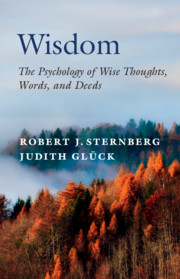Book contents
- Wisdom
- Wisdom
- Copyright page
- Dedication
- Contents
- Figures and Table
- Preface
- 1 What Is Wisdom?
- 2 Why Is Wisdom Important and Why Doesn’t Society Always See It That Way?
- 3 How Has Wisdom Been Studied in Psychology?
- 4 How Is Wisdom Measured?
- 5 How Does Wisdom Develop?
- 6 How Do We Cultivate Wisdom?
- 7 How Is Wisdom Related to Other Psychological Characteristics?
- 8 Am I Wise?
- Epilogue
- Index
8 - Am I Wise?
Published online by Cambridge University Press: 07 October 2021
- Wisdom
- Wisdom
- Copyright page
- Dedication
- Contents
- Figures and Table
- Preface
- 1 What Is Wisdom?
- 2 Why Is Wisdom Important and Why Doesn’t Society Always See It That Way?
- 3 How Has Wisdom Been Studied in Psychology?
- 4 How Is Wisdom Measured?
- 5 How Does Wisdom Develop?
- 6 How Do We Cultivate Wisdom?
- 7 How Is Wisdom Related to Other Psychological Characteristics?
- 8 Am I Wise?
- Epilogue
- Index
Summary
This chapter enables readers to assess whether they are wise. It reviews elements of wisdom and tests readers on each of them: knowledge, life span contextualism, value relativism, recognition and management of uncertainty and uncontrollability, reflectivity, learning from experience, emotion regulation, empathy, openness, critical thinking, creative thinking, balancing your own, others’, and larger interests over the long-term as well as the short-term, seeking a common good.
Keywords
- Type
- Chapter
- Information
- WisdomThe Psychology of Wise Thoughts, Words, and Deeds, pp. 169 - 188Publisher: Cambridge University PressPrint publication year: 2021

